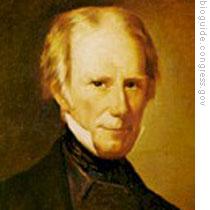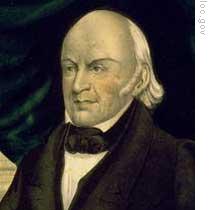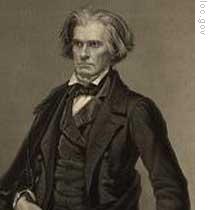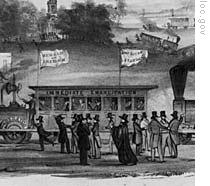-
(单词翻译:双击或拖选)
In eighteen forty, as the administration of Martin Van Buren came closer to an end, there was a widespread feeling that he had not been a strong president. He seemed unable to make the people understand his policies. The opposition1 Whig Party was happy over Van Buren's failures.
This week in our series, Harry2 Monroe and Kay Gallant3 describe how the Whigs saw an excellent chance in the upcoming election.
VOICE ONE:
 |
| Henry Clay |
The Whig leader in the Senate was Henry Clay of Kentucky. Clay told a friend he was sure he would be called on to serve as the Whig candidate for president. Other Whig leaders were not so sure. They did not question Clay's ability to be president. But he had been a candidate both in eighteen twenty-four and eighteen thirty-two. And he had lost both times.
Then there was a growing political force in the United States that would not be helpful to Clay's candidacy. That was the abolitionist movement, which opposed slavery. Abolitionists did not like Clay, because he owned slaves.
VOICE TWO:
The dispute over slavery seemed to have been laid to rest for a time. But during the eighteen thirties, it rose to the surface again. A major reason why the dispute came alive again was cotton. Cotton plants spread across the states of the south.
Cotton production had grown so heavily that it gave the south a one-crop economy. Cotton depended on the labor5 of slaves. By the eighteen thirties, cotton planters believed that without slavery, the whole economic system of the south would lie in ruins. To them, slavery was no longer just a question of right or wrong. It was a necessity for survival.
VOICE ONE:
Cotton made the agricultural south economically dependent on the industrial north. Northern ships carried southern cotton to the markets of Europe. Manufactured goods needed in the South came from the North. The South put so much time and energy into growing cotton, that it failed to give much thought to developing industries of its own.
The situation deeply troubled the political leaders of the South. What made things worse was the fact that most of the federal government's financial aid for public works went to the North.
Then there was the old dispute over import taxes. Taxes on foreign goods mostly helped the manufacturers of the North. The taxes were to be lowered in eighteen forty-two. But that was some time in the future. No one could be sure what would happen then. Such was the general political and economic picture in the United States when the abolitionist movement began to make itself felt.
(MUSIC)
VOICE TWO:
In the beginning, the abolitionist movement was organized by religious groups. The members of these groups believed there could be no compromise with evil. They felt that slavery was evil. So slavery must go.
The eighteen thirties saw the birth of anti-slavery societies in New York and New England. The societies published newspapers and pamphlets. They began to flood the country with pamphlets and anti-slavery petitions. The South tried to stop the flow of this anti-slavery literature across the borders of southern states. The Abolitionists, in turn, declared that such actions violated freedom of the press and the constitutional right of petition. This was the beginning of a long, bitter struggle. It lasted for twenty years. It finally split the Union.
VOICE ONE:
 |
| John Quincy Adams |
The abolitionists had not as yet received major support from the people of the North. Many northerners were hostile to them. But in eighteen thirty-six, the House of Representatives declared that it would not listen to any anti-slavery petitions. This became known as the "gag rule."
The Senate did not pass such a rule. But the Senate still made it almost impossible for anti-slavery petitions to come before it. Former President John Quincy Adams, who was then a congressman6, rose up in protest. He was not an abolitionist. But he led a campaign against the gag rule. Adams said the rule was a violation7 of the constitutional right to petition Congress. The gag rule made great numbers of people in the North very angry. Because of it, these people began to support the abolitionist movement.
(MUSIC)
VOICE TWO:
The increasing bitterness over the issue of slavery put Whig leader Henry Clay in a difficult position. Clay was under pressure to make a decision on slavery, on the abolitionists, and on the southern extremists.
Where did he stand? Senator Clay had always hated slavery, although he owned some slaves himself. In a Senate speech in eighteen thirty-three, he called slavery "this great evil ... the darkest spot in the map of our country."
Clay feared that the dispute over slavery might destroy him as a political leader. And, what was worse, he was afraid that it might destroy the nation. Clay was an extremely strong believer in the Union.
VOICE ONE:
Clay opposed violent action. He thought the slow growth of public opinion was better than violence in bringing about a solution to slavery. Clay hated the abolitionists and the great noise they were beginning to make over slavery. He said they were interfering8 with a southern institution and were forcing slavery into politics. Slavery, he declared, did not belong in politics.
Still, Clay was a national leader. He knew it would be bad to stand too strongly opposed to the growing abolitionist movement. Clay also opposed the southern senators who tried to prevent discussion of slavery. He said their position was emotional and extreme. It was as bad as that of the abolitionists.
VOICE TWO:
 |
| John C. Calhoun |
The Senate did, in fact, discuss slavery, in a general way. It was concerned about the legal position of the federal government in relation to slavery. Senator John C. Calhoun of South Carolina offered a resolution for consideration. This is what he said:
The Union was created by an agreement among the states. Each state had the constitutional right to complete control over its own institutions. It was the job -- the duty -- of the government in Washington to protect that right. That meant protection against any interference in the institution of slavery.
(MUSIC)
VOICE ONE:
Calhoun was most forceful when it came to slavery in the District of Columbia and in the territories. He declared that any federal, state, or private interference with slavery in those places was a direct and dangerous attack on the interests of slave states. Calhoun said the South must not surrender an inch to the abolitionist movement. "If we do," he said, "we are gone."
VOICE TWO:
Senator Clay did not like such extreme talk about states' rights. He became especially angry when states talked about separating from the Union, instead of trying to solve problems together.
"Separation," Clay said, "is a terrible word. One's ears should not accept it. I desire to see -- in continued safety and prosperity -- this Union, and no other Union. I am opposed to all separate confederacies and to all sectional conventions. This Union, this government, will do nothing to attack the rights and security of the slave-holding states."
VOICE ONE:
Clay then offered his own resolution for Senate consideration. This is what he said:
Congress had no legal power over slavery within the states. Therefore, petitions for the abolition4 of slavery must be rejected, because Congress had no constitutional right to act on them. The Senate approved Clay's resolution. It rejected the one offered by Calhoun.
VOICE TWO:
 |
| The sheet music cover for an 1844 abolitionist song called "Get Off the Track" |
Clay had acted as he did because he wanted to settle the dispute, and because he loved the Union. He did so for personal political reasons, too. Clay had defended the constitutional right of petition. That pleased the North. But he also had used a legal move to block the Abolitionist Movement from bringing anti-slavery petitions before Congress. That pleased the South.
Clay believed he had protected his national position. He told a friend: "I have acted in such a way that I lost nothing, either in the South or the North."
VOICE ONE:
As the national election of eighteen forty got closer, the Whig Party felt more hopeful. They began to believe they could defeat President Van Buren in his attempt to win a second term. But they also began to turn away from Henry Clay as a presidential candidate. The election of eighteen forty will be our story next week.
(MUSIC)
ANNOUNCER:
Our program was written by Frank Beardsley. The narrators were Harry Monroe and Kay Gallant. Transcripts9, MP3s and podcasts of our programs are online, along with historical images, at voaspecialenglish.com. Join us again next week for THE MAKING OF A NATION - an American history series in VOA Special English.
___
This is program #67 of THE MAKING OF A NATION
 收听单词发音
收听单词发音
1
opposition

|
|
| n.反对,敌对 | |
参考例句: |
|
|
|
2
harry

|
|
| vt.掠夺,蹂躏,使苦恼 | |
参考例句: |
|
|
|
3
gallant

|
|
| adj.英勇的,豪侠的;(向女人)献殷勤的 | |
参考例句: |
|
|
|
4
abolition

|
|
| n.废除,取消 | |
参考例句: |
|
|
|
5
labor

|
|
| n.劳动,努力,工作,劳工;分娩;vi.劳动,努力,苦干;vt.详细分析;麻烦 | |
参考例句: |
|
|
|
6
Congressman

|
|
| n.(美)国会议员 | |
参考例句: |
|
|
|
7
violation

|
|
| n.违反(行为),违背(行为),侵犯 | |
参考例句: |
|
|
|
8
interfering

|
|
| adj. 妨碍的 动词interfere的现在分词 | |
参考例句: |
|
|
|
9
transcripts

|
|
| n.抄本( transcript的名词复数 );转写本;文字本;副本 | |
参考例句: |
|
|
|















